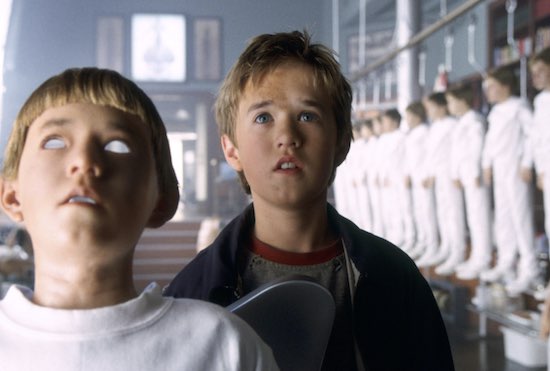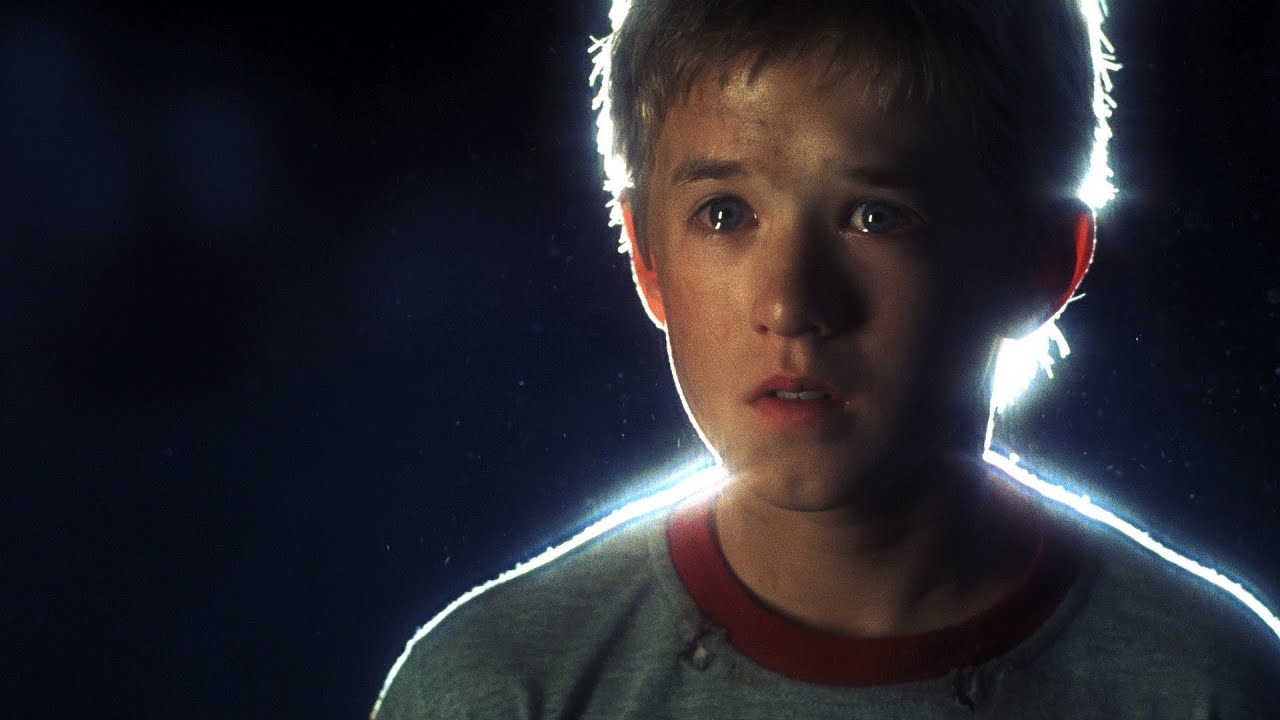It’s 1999, Steven Spielberg had just won his second Academy Award for Best Director. Saving Private Ryan had taken half a billion dollars at the box office, and until Rose let go of Jack on that floating door he was also behind the most commercially successful film in cinema history – Jurassic Park. The ’90s had furthered Spielberg’s reputation as a titan of action cinema, with the exception of the historical drama Amistad, every film he released was a commercial juggernaut and he even found time to co-found along with Jeffrey Katzenberg and David Geffen his own movie studio in Dreamworks. From then on, Hollywood answered to Spielberg.
A.I. was Spielberg’s twentieth feature (including his segment in the Twilight Zone movie) but it had originated with Stanley Kubrick back in the ’70s. Using the sci-fi short story ‘Supertoys Last All Summer Long’ as a jumping off point, he worked on the film over the next two decades but was frustrated by the lack of technological advancements he thought were necessary to realistically computer-animate the main character. Jurassic Park came out in 1993 and, inspired by that film’s innovative special effects, Kubrick’s interest in the project was revitalised yet again. But, frustrated by the limits of technology, (this time because he couldn’t create a robot lifelike enough), Kubrick moved on to Eyes Wide Shut, which would be his final film before his death.
Using Kubrick’s original vision of making “Pinocchio with robots” and a screenplay by Ian Watson originally commissioned by the late director, Spielberg got to work on an experimental gothic fairy-tale of a blockbuster where he could unleash all of his ruminations on humanity, technology, loss and family, themes he had already been exploring since the ’70s. It would be the start of a stunningly prolific period for Spielberg, as he directed six films in five years – all humanistic, philosophical reflections from an artist at the height of his powers, completely free from any restraint.
Set a century ahead, narration by Ben Kingsley at the beginning of A.I. details widespread environmental catastrophe. Melted ice caps, rising sea levels and depleted natural resources have devastated the Earth, millions have died and life for the poor is precarious – it is the future we’re constantly warned about in increasingly ominous newscasts, David Attenborough documentaries and Greta Thunberg tweets. Another thing we’re seeing in the news is the development of artificial intelligence, with the EU looking to implement rules that restrict the use of AI and regulate the development of it, particularly in terms of how facial recognition software is used and the potential it has to affect the ability to work. In the time of Spielberg’s A.I., robots are widely used for labour and also sex, visually indistinguishable from humans and highly intelligent – but lacking in emotional capacity. The natural end for the makers of these machines is creating one that can “feel”.
This is why David is made. David, played by Haley Joel Osment (because Spielberg, unlike Kubrick, thought an actor could act as a robot), is an android prototype gifted to Henry and Monica Swinton whose son, Martin, is severely ill and exists in suspended animation. Henry works for Cybertronics, the company behind the androids, and is a natural candidate for the experimental robot. David is the first android with emotions, and his very purpose is to love unconditionally. After initial reservations, David becomes the Swintons’ new son, and befriends Martin’s semi-autonomous robotic bear (who has a startling resemblance to Seth MacFarlane’s Ted).
In the early scenes of A.I., largely seen through Monica’s point of view, David is very much the creepy robot boy lurking just out of shot, often viewed through reflection in the clinically monochrome home of the Swintons. The couple, in their cruel grief, eventually accepts David. They embrace his imprinted love, his sandy hair and blank eyes, they choose to love a robot the same way they did their son. Then Martin wakes up, and there isn’t enough love for both of them. Martin is a cruel boy, not capable of David’s love but capable of the kind of disregarding selfish actions that have seen the Earth fall into irreversible ecological collapse. But the Swintons choose their malicious real life son over the robot that was built to love them until the end of time. David is abandoned, alone in the world with only the slightly creepy and occasionally bad-tempered robotic teddy bear for company. But his intent is still to be loved by the Swintons, and, remembering the story of Pinocchio and believing it, David decides to find the Blue Fairy who will turn him from a robot into a real boy.
What follows is an odyssey across the hellscape of America’s remains, where the populace drown themselves in hedonism and vice in the face of the apocalyptic scenario dooming humanity to imminent extinction. David falls upon a lurid carnival that is part-WWE and part-Rollerball, where androids are destroyed for human pleasure. The Flesh Fair embodies humanity’s cruelty towards the natural world, as well as its synergised mistrust and fascination with technology. It’s where David meets Gigolo Joe, an adult android (played by an astonishing Jude Law) whose purpose is sexual gratification. Together, they search for David’s maker, embarking on a journey that has been at the heart of philosophical thought for millennia. The androids search for their origins, just like humans have done and continue to do through religion and science. Their search takes them across a future that initially seems alien to us – but on closer inspection is eerily close to the hyperlinked society of the 21st century.
In the 22nd century-set A.I., humanity is lonely and in despair, and finds brief solace in robots manufactured to provide comfort and pleasure – an idea not entirely foreign to the rise of OnlyFans and cuddling reality TV like Made in Chelsea: intellectually meaningless, but offering respite from the pressures of modern living. The world we live in possesses remarkable technology, but none of the empathy needed to better society for the marginalised and oppressed. Social media gives an illusion of democracy, pretending to give voice to anyone with the ability to sign up, but it just boosts the wealth of a tiny few and has manipulated emotions, thoughts and experiences into currency – to the point that we are as numb to brutal violence as the baying crowd at the Flesh Fair. No other filmmaker, now or then, would ever be allowed to communicate these ideas on this scale except Spielberg. Commerce dictates that $100 million movies (plus a marketing budget) are easy to swallow, but when you have Jurassic Park, Jaws and Indiana Jones to your name, you have the power to become a pop philosopher. It’s something the filmmaker continued investigating in his ‘00s prolific streak: the dystopian Minority Report portrays personal advertising as a future horror, but is now something that happens every time you go on the internet; Munich presents a terrifying allegory of post-9/11 vengeance that continues to reverberate in an ever violent world; The Terminal tells a tale of statelessness and institutional oppression that becomes increasingly solemn every time a government minister opens their mouth to talk about immigration and refugees.
A.I.’s hammer blow comes in its much decried and divisive final act. After meeting his maker and finding out he is just another robot off the assembly line, David becomes trapped underwater in front of a theme park attraction that resembles the Blue Fairy he had been searching for. David then prays to the statue to be turned into a real boy, until his power runs out. And then, humanity becomes extinct within the next 2000 years, with the Earth now populated by an advanced race of robots who have no recollection of humans. But like David, and humanity before him, they are determined to discover the facts of their origins and David is the sole link to the past. Through their advanced technology, the future androids are able to gift David one last day with Monica Swinton, because he was never allowed to stop loving her. She tells him she loves him, and they fall asleep together. Much is made of the ending’s sentimentality, but there is nothing sentimental about a 2000-year journey for love that survives a mass extinction event. It is one of the most eerie and bleak pictures Spielberg has ever created – Monica is barely more than a ghost, and the audience knows she isn’t real. This is the future of a humanity lost in its hatred for things it doesn’t understand, that disregards its home and treats strangers with an all-consuming paranoia. Androids can be programmed to love, but humans can’t. Hollywood’s great humanist saw it coming.



